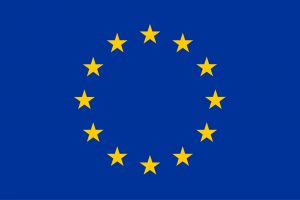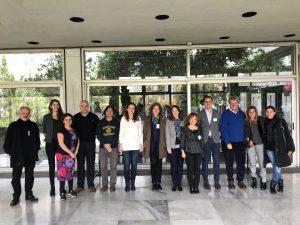Das EuroNeurotrophin Projekt beginnt
14 Early Stage Researchers to be trained in a European training network for the discovery of small molecule neurotrophin mimetics as candidate therapeutic agents for neurodegeneration and neuro-inflammation. HITS will host two young scientists who will work on the computer-aided design of neurotrophin mimetics.
Neurodegenerative diseases (ND), like Alzheimer’s disease, Parkinson’s disease, Multiple Sclerosis and Motor Neuron Disease, are on the rise with population ageing. Alzheimer’s disease alone affects 36 million people across the world, and 7 million in Europe. The economic burden for ND exceeds 724 billion € and it will reach a trillion euros by 2019. Currently, there is no cure for any ND and most of the available drugs fail to tackle ND pathogenesis.
Neurotrophins are a family of closely related secreted proteins that control a number of aspects of survival, development and function of neurons in both the central and the peripheral nervous systems. Preclinical studies point to the therapeutic potential of neurotrophins as a means of tackling both the symptoms (improving clinical status) and the pathogenesis (delaying disease progression) in several NDs despite their varied and incompletely understood underlying pathogeneses. However, poor pharmacokinetic properties of neurotrophins render their use as drugs prohibitive.
The EU-funded project EuroNeurotrophin, is the first European consortium to study small molecule neurotrophin mimetics in depth, and in order to progress their clinical translation will build the research capacity necessary for the development of novel candidate therapies. Coordinated by the National Hellenic Research Foundation (www.eie.gr), EuroNeurotrophin started on 1 January 2018 and will run for 4 years. The participants will address the major limitations of neurotrophins by developing novel small molecule mimetics with favourable profiles of stability, tissue penetration and targeted biological actions.
14 Early Stage Researchers (ESRs) will be recruited to research new approaches to ND treatment by capitalising on a synergistic combination of medicinal chemistry, natural product isolation, computer-aided drug design, structural biology, molecular biology, pharmacology, high throughput screening and ‘omics’ technologies. The project will contribute to the development of small molecule therapeutics for the treatment of neurodegenerative diseases and neuroinflammation, the understanding of neurotrophin receptor signalling, and the creation of a pan-European neurotrophin research network.
The EuroNeurotrophin network consists of 10 Beneficiaries and 8 Partner Organisations from 9 countries who together provide a highly multidisciplinary and intersectoral training and research scheme.
The Molecular and Cellular Modeling group at Heidelberg Institute for Theoretical Studies (HITS), led by Prof. Rebecca Wade, will host two ESRs. They will work on the computer-aided design of neurotrophin mimetics and the modelling and simulation of the mechanistic effects of neurotrophin modulators.
Most importantly, the EuroNeurotrophin project aims at creating a new generation of young scientists with a broad understanding and skill set in chemical biology and drug discovery with emphasis on the field of neuroscience, particularly as related to neurotrophins.
More details on the EuroNeurotrophin project are available at: www.euroneurotrophin.eu
EuroNeurotrophin Facts and Figures
EuroNeurotrophin is a research project co-funded by the European Union
- Involves 10 Beneficiaries and 8 Partner Organisations from 9 countries
- Started on 1 January 2018, Kick-off meeting 23-24 January 2018, will end on 31 December 2021
- Budget: 3.56 million euro
- Website: euroneurotrophin.eu
- Email: info@euroneurotrophin.eu
- Goal: A European training network for the discovery of small molecule neurotrophin mimetics as candidate therapeutic agents for neurodegeneration and neuroinflammation
- Contact: Dr. Theodora Calogeropoulou, Project Coordinator, tcalog@eie.gr
- More details on the EuroNeurotrophin project are available at: euroneurotrophin.eu

This project has received funding from the European Union’s Horizon 2020 research and innovation programme under the Marie Skłodowska-Curie grant agreement No 765704.
Über das HITS
Das HITS (Heidelberger Institut für Theoretische Studien) wurde 2010 von dem Physiker und SAP-Mitbegründer Klaus Tschira (1940-2015) und der Klaus Tschira Stiftung als privates, gemeinnütziges Forschungsinstitut gegründet. Es betreibt Grundlagenforschung in den Naturwissenschaften, der Mathematik und der Informatik. Zu den Hauptforschungsrichtungen zählen komplexe Simulationen auf verschiedenen Skalen, Datenwissenschaft und -analyse sowie die Entwicklung rechnergestützter Tools für die Forschung. Die Anwendungsfelder reichen von der Molekularbiologie bis zur Astrophysik. Ein wesentliches Merkmal des Instituts ist die Interdisziplinarität, die in zahlreichen gruppen- und disziplinübergreifenden Projekten umgesetzt wird. Die Grundfinanzierung des HITS wird von der Klaus Tschira Stiftung bereitgestellt.
